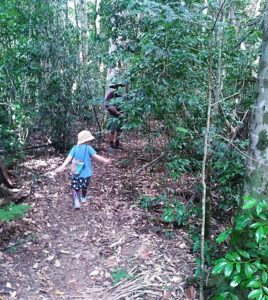
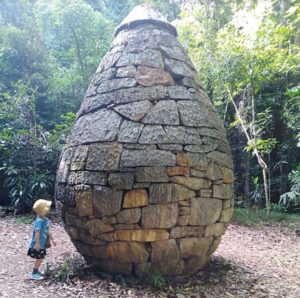



The term ‘mess’ is often viewed negatively and is associated with having to do extra and often unnecessary ‘work’. Therefore its benefits are often undervalued. As a result, providing opportunities to play that could result in mess can seem daunting and to be avoided. I too can sometimes be one of those parents! ‘Let’s paint!’ I hear her say, whilst I quickly move away everything from the paints path! This type of request is usually left for outside the home and I am never too far away whilst she plays. I often find that in this early stage of development (my daughter Fern is two), anything I set up for her is almost instantaneously rearranged, poured, spilt and mixed so I begin to question;
Is it really worth the effort?

Messy Play, also referred to as Sensory Play, is 100% worth the effort, particularly in the early stages of your child’s development. In early life, babies and young children rely on their sensory input to learn about their environment. Vital neurological pathways are built whilst they engage in sensory exploration, supporting their development of thought, language and creativity. Simply playing and investigating unstructured activities stimulates their senses, supports their ability to interact socially with their peers, problem solve and help give reason to certain situations.
Many sensory-based activities provide opportunity to practice and build upon fine and gross motor skills such as:
1. Squeezing
2. Squashing
3. Grasping and using the pincer grip
Activities promote the introduction and later use of mathematical language and concepts such as size, weight, shape and quantities.
All children need mess in their lives on a regular basis so every workshop I prepare is jammed packed full of it! Sensory play is focal to our Stay and Play sessions each week. A shared story from quality literature ignites the fire and fuels a craft idea (usually messy too), and as a result explodes into a small world, a sensory journey that all the children become a part of. They are given time to explore, imagine and create on their own, with their peers or other adults willing to try too. Our workshops always have a sensory, messy play element which supports children's’ learning and understanding, linking to necessary real life experiences. This ‘hands on’, or ‘in’, approach enables learning to move to another level.

♦ Choosing a book is always a great starting point. Take from this key characters or concepts that can be creatively expanded upon. Providing children with tactile resources to recreate parts of the story helps them recall or take the story further and retell their own story with a similar theme. Providing ‘loose parts’ gives the child opportunities to use their imagination and give the ‘part’ a new purpose within their play.

♦Incorporate the 5 senses: Consider how the play experience will involve the five senses to help you decide what materials and tools you will need. Often these can be found in and around the home for little effort and cost.
Sensory activities that involve multiple senses at the same time are more engaging and exciting. When designing my Stay and Play sessions I always think about these two steps:
Coloured cornflour and water makes an interesting ‘slime’, it behaves in different ways depending on how you interact with it and what tools you use. This is a problem solving delight for a child experiencing it for the first time!

Creating small worlds linked to the stories allows your child to make sense of the world and their environment. Carefully choosing materials that correspond closely to the ‘real thing’ can give children new experiences, ones they may not otherwise have at this stage in their life. Mixing together hot and cold, slimy and dry, spiky and smooth enables a developing awareness of similarities and differences.
For more sensory play inspiration check out our Instagram or our Stay & Play session overview.
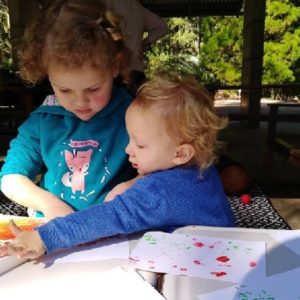
Your child is like a sponge. From early years to adolescence, interactions with those around them help to form an understanding about social norms and behaviour - helping them make friends, learn and have fun! Subsequently socialisation through exposure to different people plays a pivotal role in in your child’s development and influences their ability to learn about the wider world.
The fundamental point of socialisation is for your child to be able to function successfully in a social community - “success” in this context being the ability to communicate and remain relaxed in a social environment. Naturally parents, siblings and the wider family are often the first exposure a baby has to other human beings, the differences in other people's behaviour and personality. From their first months, recognition of your voice and face, rewarded with a smile, form the basis of initial interactions and being the process of socialisation (and brighten your day)!

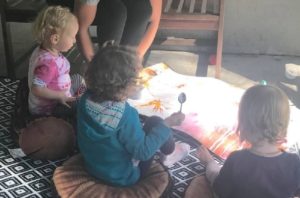
One quality that is an extremely beneficial outcome from making friends and group socialising is curiosity. Stimulating the exploration of their surroundings through offering fresh environments helps your child learn through experience, from others, ask questions and draw their own conclusions. This sense-making is fundamental to their further development as they approach ages 4 and above.
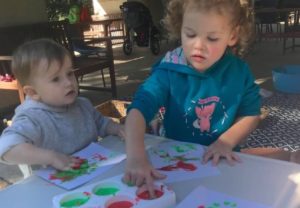
Whether they are homeschooled or attend traditional school, exposing your child to managed social environments helps them understand social settings and what is acceptable with other children and adults. This early exploration of new environments and settings equips them with the emotional intelligence to form healthy relationships going forwards.
